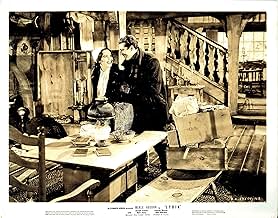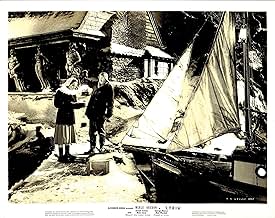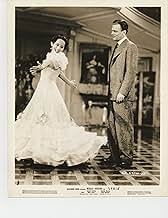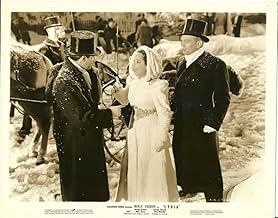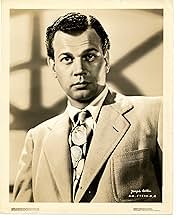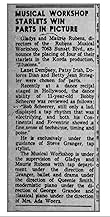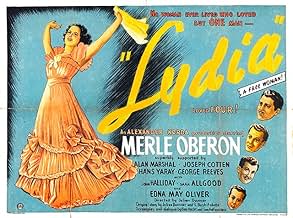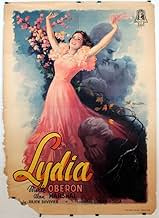Agrega una trama en tu idiomaAn elderly woman reunites with the three men who loved her in their youth.An elderly woman reunites with the three men who loved her in their youth.An elderly woman reunites with the three men who loved her in their youth.
- Dirección
- Guionistas
- Elenco
- Nominado a 1 premio Óscar
- 5 premios ganados y 1 nominación en total
Hans Jaray
- Frank
- (as Hans Yaray)
Evelyn Beresford
- Sarah's Guest
- (sin créditos)
Tyler Brooke
- Vaudeville Singer
- (sin créditos)
Frank Conlan
- Old Ned
- (sin créditos)
Harry Cording
- Hotel House Detective
- (sin créditos)
Hal K. Dawson
- Hotel Desk Clerk
- (sin créditos)
Jack Deery
- Ball Guest
- (sin créditos)
Paul Everton
- Sarah's Guest
- (sin créditos)
Jesse Graves
- Michael's Servant
- (sin créditos)
Bobbie Hale
- Bar Patron
- (sin créditos)
Gertrude Hoffman
- Mrs. Fairfield
- (sin créditos)
Opiniones destacadas
Well, as soon as we see that Joseph Cotten and Edna Oliver are in this, we know it won't be a bad film... it was nominated for best Music in a drama, but The Devil and Daniel Webster won it that year. Lydia (Merle Oberon) and Michael (Cotten) meet up in their later years, and reminisce about the past, which we always seem to remember as better than it was. Edna Oliver is (once again)the overbearing, frumpy grandmother who is very set in her ways, and is determined that Lydia will only be with a proper gentleman.
Lydia and her old beaus talk about "the grand ball" they had attended in their youth, with the harps, mirrors, and chandeliers, which everyone remembers differently. Then, we flash back to the glorious football game, on which they also disagree. We flash forward, then backward, and forward and backward, and its all a lot of work to keep up with where we are now. It's all done competently, but there are no sparks between her and the men from her past, and its a little like reading a history book. It just seems to be a lot of talk about being in love way back when. Then, about halfway through, Lydia meets up with a little boy who changes her life. Then we find out how Lydia got to where she is today. It's entertaining enough, but not one of my favorite films. Produced by Alexander Korda, who happened to be Oberon's hubby at the time.
Lydia and her old beaus talk about "the grand ball" they had attended in their youth, with the harps, mirrors, and chandeliers, which everyone remembers differently. Then, we flash back to the glorious football game, on which they also disagree. We flash forward, then backward, and forward and backward, and its all a lot of work to keep up with where we are now. It's all done competently, but there are no sparks between her and the men from her past, and its a little like reading a history book. It just seems to be a lot of talk about being in love way back when. Then, about halfway through, Lydia meets up with a little boy who changes her life. Then we find out how Lydia got to where she is today. It's entertaining enough, but not one of my favorite films. Produced by Alexander Korda, who happened to be Oberon's hubby at the time.
Here Oberon shines. The story is slight, yet gives Oberon time to revel in the Ben Hecht/Samuel Hoffenstein dialogue. Oberon plays Lydia, a woman who is searching for love. The film is framed by a reunion, with Lydia as an old woman. She is reunited with the four fellows that have chased her throughout her life. All four actors do their best with their roles, but none standout. They mostly just stare longingly at Oberon for the duration of the film. None are given much consideration or motivation other than as a lovers for Oberon can push around.
Other than Oberon, Julien Duvivier, the director, is the real star. His direction makes the most out of the simple plot. Certain scenes stick out more than others. The scene when Michael (Joseph Cotten) and Lydia run into the ball of Lydia's imagination, in slow-motion is very memorable for its dream-like feel. Also, when Frank (Hans Jaray), the blind pianist plays for the blind children, the scene is framed very beautifully. Also Miklos Rozsa's Oscar-nominated score is very good.
A pretty good drama that suffers from a necessary but clumsy framing device with the reunion, as well as a third act that doesn't jell well with the rest of the film.
Other than Oberon, Julien Duvivier, the director, is the real star. His direction makes the most out of the simple plot. Certain scenes stick out more than others. The scene when Michael (Joseph Cotten) and Lydia run into the ball of Lydia's imagination, in slow-motion is very memorable for its dream-like feel. Also, when Frank (Hans Jaray), the blind pianist plays for the blind children, the scene is framed very beautifully. Also Miklos Rozsa's Oscar-nominated score is very good.
A pretty good drama that suffers from a necessary but clumsy framing device with the reunion, as well as a third act that doesn't jell well with the rest of the film.
Merle Oberon stars in the title role of Lydia who seems to have all the young gallants of the turn of the last century just champing at the bit. But it's now 1941 and we meet Merle as an old spinster woman who is quite the well known public philanthropist. She never married, but not that didn't have plenty of chances.
Four of her old beaus have gathered at the invitation of one of them Joseph Cotten who was the son of the butler John Halliday in the home where Oberon grew up. Cotten is now a respectable physician and the others he's invited are George Reeves a nightclub owner, Hans Jaray a blind concert pianist, and a sea captain Alan Marshal.
Merle loved them all in her own way, but couldn't quite commit to any of them. All of them saw a different Merle in their salad days.
I'm thinking that the film lost a great deal in translation from the original French movie Dance Program which was also directed by Julian Duvivier. It would almost have to be the case given the far stricter censorship that we had as opposed to the French.
Lydia is entertaining and good enough and the cast performs their roles well. But the film is a bland romantic concoction, I'll bet the original French is much better.
Four of her old beaus have gathered at the invitation of one of them Joseph Cotten who was the son of the butler John Halliday in the home where Oberon grew up. Cotten is now a respectable physician and the others he's invited are George Reeves a nightclub owner, Hans Jaray a blind concert pianist, and a sea captain Alan Marshal.
Merle loved them all in her own way, but couldn't quite commit to any of them. All of them saw a different Merle in their salad days.
I'm thinking that the film lost a great deal in translation from the original French movie Dance Program which was also directed by Julian Duvivier. It would almost have to be the case given the far stricter censorship that we had as opposed to the French.
Lydia is entertaining and good enough and the cast performs their roles well. But the film is a bland romantic concoction, I'll bet the original French is much better.
It is almost 20 years ago, I saw this movie at TV.. and it still break my heart now.. Very touching. The ending is so unforgettable.. I could clearly remember the story, and the ENDING.. so sad, Lydia is so lovely.. and she was not the only one who suffer, but also her admirers.. obviously wasting years in reaching out for love!? What is love? Did Lydia sure that she is in love with that guy? She don't even know him.. they just get together for such a short time.. well, it is very romantic.. and that is why I still remember this movie, and want to see that again.. but as I grew older.. it is not romantic to me anymore.. but still she still break my heart, cos I think it is quite hard to find someone who could so insist in love or.. her own belief? What am I talking about?
After dedicating a home for blind and crippled children, doddering old Merle Oberon (as Lydia MacMillan), who never married, attends a surprise gathering of her old boyfriends. The reunion is arranged by physician Joseph Cotten (as Michael Fitzpatrick). The son of Ms. Oberon's family butler, Mr. Cotten has also invited blind musician Hans Jaray (as Frank Andre) and future "Superman" George Reeves (as Bill Willard). A fourth beau, seafaring adventurer Alan Marshal (as Richard Mason) may or may not appear. He is one of the story's mysteries, so stay tuned. Oberon and her old suitors reminisce about their romances, in flashbacks beginning in 1897, when "the prettiest girl in Boston" was a desirable young maiden...
"Lydia" is a re-make of director Julien Duvivier's "Un carnet de bal" (1937), re-fashioned entirely for star Merle Oberon by producer Alexander Korda. The original French export was a worldwide hit, with Mr. Duvivier and his remarkable original players receiving much critical acclaim. There are some significant changes in the story, but they do improve the central played by Mrs. Korda (Oberon). She is the reason for the picture, clearly. An impressive group was hired for this motion picture; their skills are intermittently evident, but the totality of the film is far too pretentious...
Watch "Lydia" for the production values and moments of perfection. You'll find much of the latter in the work of supporting actress Edna May Oliver (as Sarah "Granny" MacMillan). This was the last appearance of Ms. Oliver, a classic character actress who became the most valuable player nearly every time she appeared on screen. Oliver's character appears in the flashbacks, as Oberon's wealthy and outspoken grandmother. She complains about mysterious internal ailments, but is considered a hypochondriac. The veteran actress died in 1942, of internal ailments. In real life, Oliver passed away peacefully in her sleep. On screen, she plays her expiration scene with Shakespearian majesty. This is how it should be done.
****** Lydia (9/18/41) Julien Duvivier ~ Merle Oberon, Joseph Cotten, Edna May Oliver, Alan Marshal
"Lydia" is a re-make of director Julien Duvivier's "Un carnet de bal" (1937), re-fashioned entirely for star Merle Oberon by producer Alexander Korda. The original French export was a worldwide hit, with Mr. Duvivier and his remarkable original players receiving much critical acclaim. There are some significant changes in the story, but they do improve the central played by Mrs. Korda (Oberon). She is the reason for the picture, clearly. An impressive group was hired for this motion picture; their skills are intermittently evident, but the totality of the film is far too pretentious...
Watch "Lydia" for the production values and moments of perfection. You'll find much of the latter in the work of supporting actress Edna May Oliver (as Sarah "Granny" MacMillan). This was the last appearance of Ms. Oliver, a classic character actress who became the most valuable player nearly every time she appeared on screen. Oliver's character appears in the flashbacks, as Oberon's wealthy and outspoken grandmother. She complains about mysterious internal ailments, but is considered a hypochondriac. The veteran actress died in 1942, of internal ailments. In real life, Oliver passed away peacefully in her sleep. On screen, she plays her expiration scene with Shakespearian majesty. This is how it should be done.
****** Lydia (9/18/41) Julien Duvivier ~ Merle Oberon, Joseph Cotten, Edna May Oliver, Alan Marshal
¿Sabías que…?
- TriviaThe poem Lydia and Bob quote at the ball is "The Night has a Thousand Eyes" by Francis William Bourdillon, a Victorian English poet (1852-1921). The text is "The night has a thousand eyes, / And the day but one; / Yet the light of the bright world dies / With the dying sun. / The mind has a thousand eyes, / And the heart but one: / Yet the light of a whole life dies / When love is done."
- ErroresAt one point, Granny mentions her intention to send Lydia to her cousin Sally's. In the next scene, Lydia refers to her cousin as "Mary".
- ConexionesFeatured in Ladies in Black (2018)
Selecciones populares
Inicia sesión para calificar y agrega a la lista de videos para obtener recomendaciones personalizadas
- How long is Lydia?Con tecnología de Alexa
Detalles
- Tiempo de ejecución1 hora 44 minutos
- Color
- Relación de aspecto
- 1.37 : 1
Contribuir a esta página
Sugiere una edición o agrega el contenido que falta

Principales brechas de datos
By what name was Lydia (1941) officially released in India in English?
Responda
